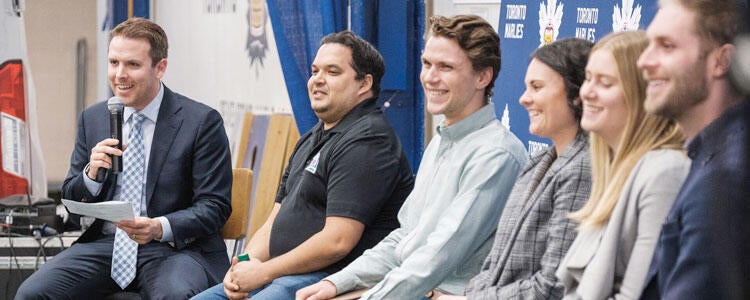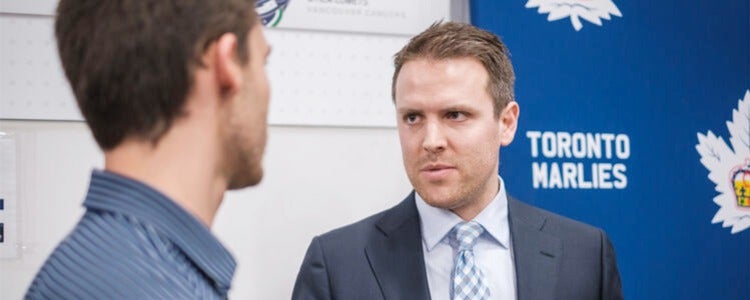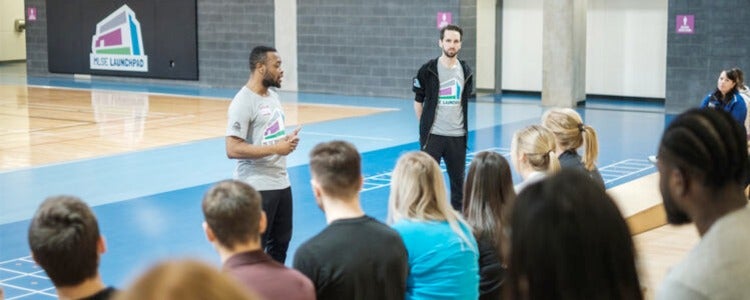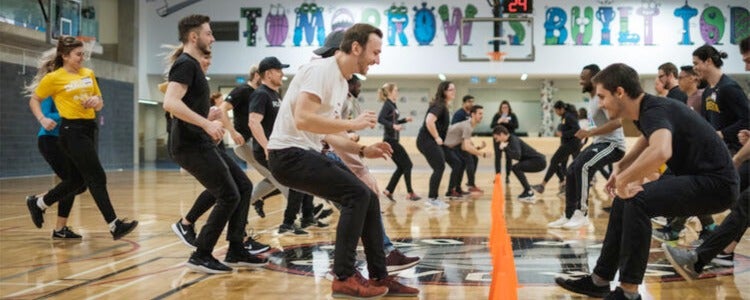
When Nathaniel signed up for REC 413 with Katie Misener, a professor in Waterloo's Department of Recreation and Leisure Studies, he knew it would be good — he’d taken two of her courses already.
But he didn’t expect that, two months into class, he’d attend a private networking function at MLSE LaunchPad with executives from the Toronto Raptors, Maple Leafs, and Argonauts, asking questions to help him complete his major research project.
“The experience had a massive role in shaping my career path,” he says.
Finding solutions to real problems
MLSE LaunchPad is Maple Leaf Sports and Entertainment’s “living lab,” a world-class sports facility that combines innovative sports programming designed to help under-served youth thrive, and cutting-edge sports development research to improve the lives of young people around the world.

REC 413: Innovative Solutions in Recreation and Sport Business is a capstone course, where students integrate and apply the knowledge they’ve gained through years of courses and co-op experiences. For the course’s major project, sport or recreation organizations present real-life problems to the class. Then in small groups, students act like consulting agencies, going deep into their assignment over the course of the term and presenting their findings to the organization.
One of those organizations is MLSE LaunchPad. At the start of the course, LaunchPad’s head of research met with the class to discuss their assignments. “By working closely with these organizations, students get an insider view into decision making, problem solving, and group work,” says Misener. Halfway through their project, students got to visit the LaunchPad for a tour and Q&A session with the sport programming team, research staff, and executives to get extra insight into the issues that students are working on.

“Students have to use design thinking to understand the roots of the problem,” Misener explains. “An organization might recognize that they need to improve their marketing or programming strategy. But my students then have to do a deep dive into the roots of the problem before they can generate innovative solutions."
"Students have been hired right out of these projects," she adds.
Discover if Recreation and Leisure Studies is right for you.
Group work that can make a difference
Nathaniel is a former youth coach himself — he says he’s passionate about “trying to help young athletes be the best they can be, but also teaching the values of sport, not a ‘win-every-game’ mentality.” Nathaniel’s group worked for MLSE LaunchPad on the problem of “ghosting” in free youth programs: parents sign kids up, but then don’t show up to the program which takes a potential space away from another participant. “Their user base is youth facing barriers in Toronto's urban centre — so we were trying to figure out how to accommodate the different barriers families face to healthy youth development through sport.” Their solution: run programs for adults in tandem, such as English as a Second Language (ESL) classes or résume-building workshops.
As it turned out, Nathaniel and his group were already thinking like the pros: LaunchPad staff had started work on a similar solution to the problem of ghosting and were able to integrate what the group uncovered. “It was good that we were able to do a little bit of the extra thinking in that area for them and share what we had found.”

Collaboration is the name of the game
Nathaniel is now pursuing a Master’s degree. And his research focus is inspired by his work with Launchpad: “My focus is on how we, as a society, can make programming more accessible for diverse groups in our communities who often do not have access to the traditional youth sport system."
“You can look at an organization’s website as much as you want,” he adds, but their group project took on a lot more meaning after they’d seen LaunchPad’s staff in action. “Once we were able to see in person what LaunchPad was like and meet the people who were running the programs, it reinforced that this was worth putting in the effort to try to contribute as much as we possibly can.”
And that attitude is just what Misener wants students to take away from REC 413 as they start their careers.
Collaboration is such an important skill in our field. Students graduating from our Recreation and Sport Business program are well-positioned for leadership roles having developed important relational skills with clients and peers, and this team-based work is a critical part of their experience
![]()
![]()




